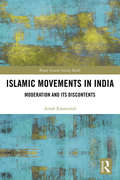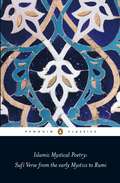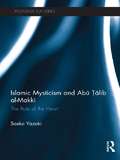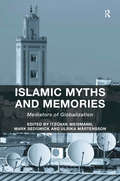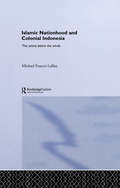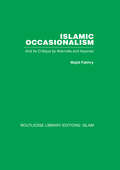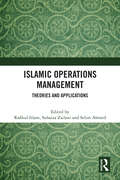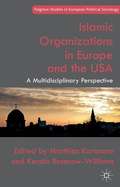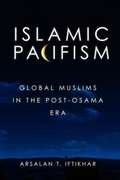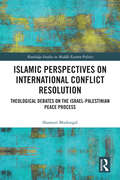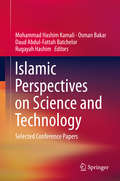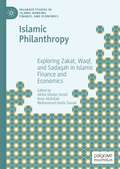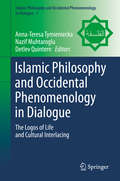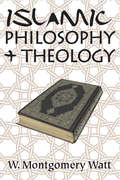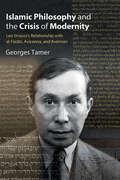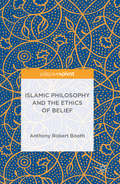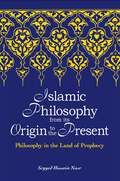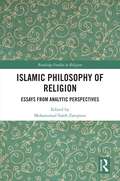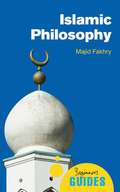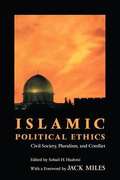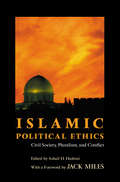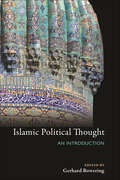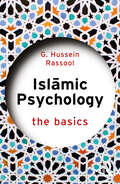- Table View
- List View
Islamic Movements in India: Moderation and its Discontents (Royal Asiatic Society Books)
by Arndt-Walter EmmerichThis book analyses the emerging trend of Muslim-minority politics in India and illustrates that a fundamental shift has occurred over the last 20 years from an identity-dominated, self-serving and inward-looking approach by Muslim community leaders, Islamic authorities and social activists that seeks to protect Islamic law and culture, towards an inclusive debate centred on socio-economic marginalisation and minority empowerment. The book focuses on Muslim activists, and members and affiliates of the Popular Front of India (PFI), a growing Muslim-minority and youth movement. Drawing on qualitative fieldwork undertaken since 2011, the author analyses recent literature on Muslim citizenship politics and the growing involvement of Islamist organisations and movements in the democratic process and electoral politics to demonstrate that religious groups play a role in politics, development, and policy making, which is often ignored within political theory. The book suggests that further scrutiny is needed of the assumption that Muslim politics and Islamic movements are incompatible with the democratic political framework of the modern nation state in India and elsewhere. Contributing to a more nuanced understanding of how Islamic movements utilise various spiritual, organisational and material resources and strategies for collective action, community development and democratic engagement, the book will be of interest to academics in the field of political Islam, South Asian studies, sociology of religion and development studies.
Islamic Mystical Poetry: Sufi Verse from the early Mystics to Rumi
by Mahmood JamalWritten from the ninth to the twentieth century, these poems represent the peak of Islamic Mystical writing, from Rabia Basri to Mian Mohammad Baksh. Reflecting both private devotional love and the attempt to attain union with God and become absorbed into the Divine, many poems in this edition are imbued with the symbols and metaphors that develop many of the central ideas of Sufism: the Lover, the Beloved, the Wine, and the Tavern; while others are more personal and echo the poet's battle to leave earthly love behind. These translations capture the passion of the original poetry and are accompanied by an introduction on Sufism and the common themes apparent in the works. This edition also includes suggested further reading.
Islamic Mysticism and Abu Talib Al-Makki: The Role of the Heart (Routledge Sufi Series)
by Saeko YazakiBoth in everyday language and religious metaphor, the heart often embodies the true self and is considered to be the seat of emotion in many cultures. Many Muslim thinkers have attempted to clarify the nature of Sufism using its metaphorical image, particularly in the tenth and eleventh centuries. This book examines the work of Abū Tālib al-Makkī and his wider significance within the Sufi tradition, with a focus on the role of the heart. Analysing his most significant work, Qūt al-qulūb (‘The Nourishment of Hearts’), the author goes beyond an examination of the themes of the book to explore its influence not only in the writing of Sufis, but also of Hanbalī and Jewish scholars. Providing a comprehensive overview of the world of al-Makkī and presenting extracts from his book on religious characteristics of the heart with selected passages in translation for the first time in English, this book will give readers a better understanding not only of the essential features of Sufism, but also the nature of mysticism and its relation to monotheistic faiths.
Islamic Myths and Memories: Mediators of Globalization
by Itzchak WeismannIslamic myths and collective memory are very much alive in today’s localized struggles for identity, and are deployed in the ongoing construction of worldwide cultural networks. This book brings the theoretical perspectives of myth-making and collective memory to the study of Islam and globalization and to the study of the place of the mass media in the contemporary Islamic resurgence. It explores the annulment of spatial and temporal distance by globalization and by the communications revolution underlying it, and how this has affected the cherished myths and memories of the Muslim community. It shows how contemporary Islamic thinkers and movements respond to the challenges of globalization by preserving, reviving, reshaping, or transforming myths and memories.
Islamic Nationhood and Colonial Indonesia: The Umma Below the Winds (SOAS/Routledge Studies on the Middle East)
by Michael Francis LaffanDrawing on previously unavailable archival material, this book argues that Indonesian nationalism rested on Islamic ecumenism heightened by colonial rule and the pilgrimage. The award winning author Laffan contrasts the latter experience with life in Cairo, where some Southeast Asians were drawn to both reformism and nationalism. After demonstrating the close linkage between Cairene ideology and Indonesian nationalism, Laffan shows how developments in the Middle East continued to play a role in shaping Islamic politics in colonial Indonesia.
Islamic Occasionalism: and its critique by Averroes and Aquinas
by Majid FakhryOriginally published in 1958.Occasionalism is generally associated in the history of philosophy with the name of Malébranche . But long before this time, the Muslim Theologians of the ninth and tenth centuries had developed an occasionalist metaphysics of atoms and accidents. Arguing that a number of distinctively Islamic concepts such as fatalism and the surrender of personal endeavour cannot be fully understood except in the perspective of the occasionalist world view of Islam, the volume also discusses the attacks on Occasionalism made by Averroes and St. Thomas Aquinas.
Islamic Operations Management: Theories and Applications
by Rafikul Islam Suhaiza Zailani Selim AhmedManaging operations is an integral part of all business and comprises a number of components, including quality management, production planning, supply chain management, logistics, and inventory control. The effective management of operations plays a defining role in enhancing business efficiency and is a lynchpin for success.This book explores how Islamic principles and tools can be applied to improve operations management across industries. While Islamic banking and finance are established disciplines, there is yet little evidence of how exploring operations management from an Islamic lens can improve efficiency. Bringing together leading scholars across subdisciplines, the Editors fill the long-standing gap and address the rising demand for halal products and services by providing a unique perspective to define and enhance an important, growing field.This book will be a useful reference for those who wish to understand all aspects of Islamic business operations and halal logistics. The book will be helpful to academics, researchers, and upper level students, in particular to those who are looking to further their research on how Islamic principles can be applied to business operations.
Islamic Organizations in Europe and the USA
by Matthias Kortmann Kerstin Rosenow-WilliamsThis volume explores the variety of forms, strategies and practices of Islamic organizations in Europe and the United States. It focuses on the reactions of organized Muslims at local, national, and transnational levels to the on-going debates on their integration into society and the structures of state-church relations.
Islamic Pacifism: Global Muslims in the Post-Osama Era
by Arsalan IftikharThis book offers young girls and boys of all colors and religions around the world a nonviolent antidote to many of our shared social and political issues affecting our globe today.
Islamic Perspectives on International Conflict Resolution: Theological Debates and the Israel-Palestinian Peace Process (Routledge Studies in Middle Eastern Politics)
by Shameer ModongalUpturning the traditional view of religion as a source of conflict, this book studies Islamic perspectives of international conflict resolution, re-interpreting the possibility of Israel-Palestine reconciliation beyond traditional secular frameworks. Beginning with an analysis of both classical and modern Islamic texts, the book provides a theoretical overview of Islamic conflict resolution before exploring the Israel-Palestine conflict in its historical, social and political dimensions. This framework allows for a real-world examination of Islamic conflict resolution in the context of Israel-Palestine theological debates. The author also critically assesses differing ideological and political views among Islamic scholars, divided by those supporting and those opposing a peace treaty between Israel and Palestine. Ultimately, it is argued that neglecting religion misses the opportunity to inject the spiritual dimension needed for reconciling the Israelis and Palestinians. The book’s multi-disciplinary approach will be of interest to a range of academics and policymakers, including those involved in International Relations and Islamic Studies. However, its accessible prose and engaging content will also appeal to undergraduates and general readers interested in Middle Eastern politics.
Islamic Perspectives on Science and Technology
by Mohammad Hashim Kamali Osman Bakar Daud Abdul-Fattah Batchelor Rugayah HashimThis book presents 25 selected papers from the International Conference on "Developing Synergies between Islam & Science and Technology for Mankind's Benefit" held at the International Institute for Advanced Islamic Studies Malaysia, Kuala Lumpur, in October 2014. The papers cover a broad range of issues reflecting the main conference themes: Cosmology and the Universe, Philosophy of Science and the Emergence of Biological Systems, Principles and Applications of Tawhidic Science, Medical Applications of Tawhidic Science and Bioethics, and the History and Teaching of Science from an Islamic Perspective. Highlighting the relationships between the Islamic religious worldview and the physical sciences, the book challenges secularist paradigms on the study of Science and Technology. Integrating metaphysical perspectives of Science, topics include Islamic approaches to S&T such as an Islamic epistemology of the philosophy of science, a new quantum theory, environmental care, avoiding wasteful consumption using Islamic teachings, and emotional-blasting psychological therapy. Eminent contributing scholars include Osman Bakar, Mohammad Hashim Kamali, Mehdi Golshani, Mohd. Kamal Hassan, Adi Setia and Malik Badri. The book is essential reading for a broad group of academics and practitioners, from Islamic scholars and social scientists to (physical) scientists and engineers.
Islamic Philanthropy: Exploring Zakat, Waqf, and Sadaqah in Islamic Finance and Economics (Palgrave Studies in Islamic Banking, Finance, and Economics)
by Abdul Ghafar Ismail Rose Abdullah Muhammad Hasbi ZaenalIn Islam, philanthropy is a spectrum of activity, and these activities differ in their purpose and in the principles on which they operate. To fully understand philanthropy, it is vital to examine not only its purpose but its motive and outcomes. This book identifies three types of philanthropy within this spectrum: Philanthropy as relief (zakat), which seeks to alleviate human suffering; philanthropy as an improvement (waqf), which seeks to maximize individual human potential and is energized by a principle that seeks to progress individuals and their society; and philanthropy as reform (sadaqah), which seeks to solve social problems. Philanthropy as civic engagement seeks to build better community structures and services and is directed by civic responsibility. This book explores philanthropy in Islam that covers the three primary spectra of activity: zakat, waqf, and sadaqah. Combining contributions from the Conference on Philanthropy for Humanitarian Aid under the joint organization of Sultan Sharif Ali Islamic University and the International Research Centre of Islamic Economics and Finance, International Islamic University College in collaboration with the Islamic Research and Training Institute, this book will be of interest to students, policymakers, practitioners, and researchers in the areas of Islamic finance and Islamic economics.
Islamic Philosophy and Occidental Phenomenology in Dialogue
by Anna-Teresa Tymieniecka Nazif Muhtaroglu Detlev QuinternThe contributions, composed in this volume, are inspired not only by the necessity but also by the potentialities of a process which continues and deepens cross-cultural understanding, especially between Islamic and Western philosophy. Following the tradition of an East-Western symphony of thoughts, the authors focus on common horizons and while applying comparative and historical approaches, varieties of unity appear on the ways towards a New Enlightenment. The creative force, orchestrating the harmony in the web of Life, communicates in the mean time with the capacities of human beings, advancing in deciphering its micro-macrocosmic dimensions. Here, the encounter of the Logos of Life Philosophy (A-T. Tymieniecka) and Islamic Philosophy open the space for constructive disputation. In the wake of the crisis of postmodern unknowability, paths towards a new critique of reason go hand in hand with fundamental issues, being reflected newly.
Islamic Philosophy and Theology: An Extended Survey (The\new Edinburgh Islamic Surveys Ser.)
by W. Montgomery WattEvents are making clear to ever-widening circles of readers the need for something more than a superficial knowledge of non-European cultures. In particular, the blossoming into independence of numerous African states, many of which are largely Muslim or have a Muslim head of state, has made clear the growing political importance of the Islamic world, and, as a result, the desirability of extending and deepening the understanding and appreciation of this great segment of mankind. Islamic philosophy and theology are looked at together in a chronological framework in this volume. From a modern standpoint, this juxtaposition of the two disciplines is important for the understanding of both; but it should be realized at the outset that it is a reversal of the traditional Islamic procedure. Not merely were the disciplines different, but in the earlier centuries the exponents were two different sets of persons, trained in two different educational traditions, each with its own separate institutions. There was little personal contact between philosophers and theologians, and the influence of the two disciplines on one another was largely by way of polemics. Eventually while philosophy died out as a separate discipline in the Islamic world, many parts of it were incorporated in theology. This work is designed to give the educated reader something more than can be found in the usual popular books. The work undertakes to survey a special part of the field, and to show the present stage of scholarship. Where there is a clear picture this will be given; but where there are gaps, obscurities and differences of opinion, these will also be indicated. This work is brilliant in its design, style, and intimate understanding. It is a must read for specialists and policy makers alike.
Islamic Philosophy and the Crisis of Modernity: Leo Strauss's Relationship with al-Fārābī, Avicenna, and Averroes (SUNY series in the Thought and Legacy of Leo Strauss)
by Georges TamerThis study examines the impact of the medieval Muslim philosophers al-Fārābī, Ibn Sīnā (Avicenna) and Ibn Rushd (Averroes) on Leo Strauss. Through meticulous source analysis, Georges Tamer critically evaluates Strauss's interpretation of their works. Furthermore, he explores how Islamic philosophy shaped Strauss's understanding of Maimonides and Plato, providing a compelling solution to the modernity crisis he identified. Offering fresh perspectives on the evolution of Strauss's thought and his distinctive approach to Arabic sources, Tamer sheds light on the pivotal role of al-Fārābī, the most significant Muslim philosopher in Strauss's view, including key aspects of al-Fārābī's political philosophy and his nuanced take on Plato's ideas. Islamic Philosophy and the Crisis of Modernity is a valuable addition to current scholarship on Strauss. Both philosophically erudite and philologically rigorous, Tamer presents the reader with a balanced perspective on Strauss's insights without being overly reverential or dismissive.
Islamic Philosophy and the Ethics of Belief
by Anthony Robert BoothIn this bookthe author argues that the Falasifa,the Philosophers of the Islamic Golden Age, are usefully interpreted throughthe prism of the contemporary, western ethics of belief. He contends that theirposition amounts to what he calls 'Moderate Evidentialism' - that only for theepistemic elite what one ought to believe is determined by one's evidence. Theauthor makes the case that the Falasifa's position is well argued, ingeniouslycircumvents issues in the epistemology of testimony, and is well worth takingseriously in the contemporary debate. He reasons that this is especially thecase since the position has salutary consequences for how to respond tothe sceptic, and for how we are to conceive of extremist belief.
Islamic Philosophy from Its Origin to the Present: Philosophy in the Land of Prophecy (SUNY series in Islam)
by Seyyed Hossein NasrAIslamic Philosophy from Its Origin to the Present offers a comprehensive overview of Islamic philosophy from the ninth century to the present day. As Seyyed Hossein Nasr attests, within this tradition, philosophizing is done in a world in which prophecy is the central reality of life—a reality related not only to the realms of action and ethics but also to the realm of knowledge. Comparisons with Jewish and Christian philosophies highlight the relation between reason and revelation, that is, philosophy and religion.Nasr presents Islamic philosophy in relation to the Islamic tradition as a whole, but always treats this philosophy as philosophy, not simply as intellectual history. In addition to chapters dealing with the general historical development of Islamic philosophy, several chapters are devoted to later and mostly unknown philosophers. The work also pays particular attention to the Persian tradition.Nasr stresses that the Islamic tradition is a living tradition with significance for the contemporary Islamic world and its relationship with the West. In providing this seminal introduction to a tradition little-understood in the West, Nasr also shows readers that Islamic philosophy has much to offer the contemporary world as a whole.
Islamic Philosophy of Religion: Essays from Analytic Perspectives (Routledge Studies in Religion)
by Mohammad Saleh ZarepourThis volume focuses on Islamic philosophy of religion with a range of contributions from analytic perspectives. It opens with methodological discussions on the relationship between the history of Islamic philosophy and contemporary analytic philosophy. The book then offers a philosophical examination of some specific Islamic beliefs as well as some approaches to general beliefs that Islam shares with other religions. The chapters address a variety of topics from the existence and attributes of God through to debates on science and religion. The authors are predominantly scholars from Muslim backgrounds who tackle philosophical issues concerning Islam as their own living religion, representing internal perspectives that have never been vocal in analytic philosophy of religion so far. This is valuable reading for scholars and students of philosophy, theology, and religious studies.
Islamic Philosophy: A Beginner's Guide (Beginner's Guides #8)
by Majid FakhryFrom the introduction of Greek Philosophy into the Muslim world in the eighth century, right through to modern times, Majid Fakhry charts the evolution and interaction of philosophy, theology, and mysticism in the Islamic context. Highlighting key individuals, movements, concepts and writings, Fakhry also explores the conflicts and controversies between anti- and pro-philosophical parties that have characterised the development of Islamic thought. Majid Fakhry is Emeritus Professor of Philosophy at the Center for Muslim-Christian Understanding, Georgetown University, Washington DC.
Islamic Political Ethics
by Sohail H. HashmiOne of the most dynamic aspects of the Islamic revival during the past two centuries has been the rethinking of Islamic political thought. A broad range of actors, ideas, and ideologies characterize the debate on how Islamic ethics and law should be manifested in modern institutions. Yet this aspect of the "return to Islam" has been neglected by policymakers, the media, and even many scholars, who equate "political Islam" with merely one strand, labeled "Islamic fundamentalism." Bringing together ten essays from six volumes of the Ethikon Series in Comparative Ethics, this book gives a rounded treatment to the subject of Islamic political ethics. The authors explore the Islamic ethics of civil society, boundaries, pluralism, and war and peace. They consider questions of diversity, discussing, among other subjects, Islamic regimes' policies regarding women and religious minorities. The chapters on war and peace take up such crucial and timely issues as the Islamic ethics of jihad, examining both the legitimate conditions for the declaration of war and the proper conduct of war. In their discussions, the contributors analyze the works of classical writers as well as the full range of modern reinterpretations. But beyond these analyses of previous and contemporary thinkers, the essays also reach back to the two fundamental sources of Islamic ethics--the Qur'an and traditions of the Prophet--to develop fresh insights into how Islam and Muslims can contribute to human society in the twenty-first century.
Islamic Political Ethics: Civil Society, Pluralism, and Conflict (Ethikon Series in Comparative Ethics)
by Sohail H. HashmiOne of the most dynamic aspects of the Islamic revival during the past two centuries has been the rethinking of Islamic political thought. A broad range of actors, ideas, and ideologies characterize the debate on how Islamic ethics and law should be manifested in modern institutions. Yet this aspect of the "return to Islam" has been neglected by policymakers, the media, and even many scholars, who equate "political Islam" with merely one strand, labeled "Islamic fundamentalism." Bringing together ten essays from six volumes of the Ethikon Series in Comparative Ethics, this book gives a rounded treatment to the subject of Islamic political ethics.The authors explore the Islamic ethics of civil society, boundaries, pluralism, and war and peace. They consider questions of diversity, discussing, among other subjects, Islamic regimes' policies regarding women and religious minorities. The chapters on war and peace take up such crucial and timely issues as the Islamic ethics of jihad, examining both the legitimate conditions for the declaration of war and the proper conduct of war.In their discussions, the contributors analyze the works of classical writers as well as the full range of modern reinterpretations. But beyond these analyses of previous and contemporary thinkers, the essays also reach back to the two fundamental sources of Islamic ethics--the Qur'an and traditions of the Prophet--to develop fresh insights into how Islam and Muslims can contribute to human society in the twenty-first century.The authors are Dale F. Eickelman, Hasan Hanafi, Sohail H. Hashmi, Farhad Kazemi, John Kelsay, Muhammad Khalid Masud, Sulayman Nyang, Bassam Tibi, and M. Raquibuz Zaman.From the foreword by Jack Miles:"Western foreign ministers and secretaries of state may have to learn a little theology if the looming clash between embattled elements both in the West and in the Muslim umma is to yield to disengagement and peaceful coexistence, to say nothing of fruitful collaboration. . . . It is, then, no idle academic exercise that the thinkers whose work is collected here have in hand. The long-term practical importance of their work can scarcely be overstated."
Islamic Political Thought: An Introduction
by Gerhard BoweringA concise and authoritative introduction to Islamic political ideasIn sixteen concise chapters on key topics, this book provides a rich, authoritative, and up-to-date introduction to Islamic political thought from the birth of Islam to today, presenting essential background and context for understanding contemporary politics in the Islamic world and beyond. Selected from the acclaimed Princeton Encyclopedia of Islamic Political Thought, and focusing on the origins, development, and contemporary importance of Islamic political ideas and related subjects, each chapter offers a sophisticated yet accessible introduction to its topic. Written by leading specialists and incorporating the latest scholarship, the alphabetically arranged chapters cover the topics of authority, the caliphate, fundamentalism, government, jihad, knowledge, minorities, modernity, Muhammad, pluralism and tolerance, the Qur'an, revival and reform, shari?a (sacred law), traditional political thought, ‘ulama' (religious scholars), and women. Read separately or together, these chapters provide an indispensable resource for students, journalists, policymakers, and anyone else seeking an informed perspective on the complex intersection of Islam and politics.The contributors are Gerhard Bowering, Ayesha S. Chaudhry, Patricia Crone, Roxanne Euben, Yohanan Friedmann, Paul L. Heck, Roy Jackson, Wadad Kadi, John Kelsay, Gudrun Krämer, Ebrahim Moosa, Armando Salvatore, Aram A. Shahin, Emad El-Din Shahin, Devin J. Stewart, SherAli Tareen, and Muhammad Qasim Zaman.A new afterword discusses the essays in relation to contemporary political developments.
Islamic Politics, Muslim States, and Counterterrorism Tensions
by Peter HenneThe US Global War on Terror and earlier US counterterrorism efforts prompted a variety of responses from Muslim states despite widespread Islamic opposition. Some cooperated extensively, some balked at US policy priorities, and others vacillated between these extremes. This book explains how differing religion-state relationships, regimes' political calculations, and Islamic politics combined to produce patterns of tensions and cooperation between the United States and Muslim states over counterterrorism, using rigorous quantitative analysis and case studies of Pakistan, the United Arab Emirates, and Turkey. The book combines recent advances in the study of political institutions with work on religion and politics to advance a novel theory of religion and international relations that will be of value to anyone studying religion, terrorism, or Islamic politics. It also provides numerous insights into current events in the Middle East by extending its analysis to the Arab Spring and the rise of the Islamic State.
Islamic Populism in Indonesia and the Middle East
by Vedi R. HadizIn a novel approach to the field of Islamic politics, this provocative new study compares the evolution of Islamic populism in Indonesia, the country with the largest Muslim population in the world, to the Middle East. Utilising approaches from historical sociology and political economy, Vedi R. Hadiz argues that competing strands of Islamic politics can be understood as the product of contemporary struggles over power, material resources and the result of conflict across a variety of social and historical contexts. Drawing from detailed case studies across the Middle East and Southeast Asia, the book engages with broader theoretical questions about political change in the context of socio-economic transformations and presents an innovative, comparative framework to shed new light on the diverse trajectories of Islamic politics in the modern world.
Islamic Psychology: The Basics (The Basics)
by G. Hussein RassoolIslamic Psychology: The Basics is a jargon-free and accessible introduction that explores psychology from an Islāmic perspective, and provides a foundation level overview of the fundamental principles and practices of Islāmic psychology. The book introduces concepts, models, approaches, themes, and theories you need to know to study the mind, soul, and behaviour based on Islāmic scripture. Offering an overview of Islāmic psychology and what Islāmic psychologists do, chapters address key topics including the history of the evolution of the science of the soul, and the psychology of human behaviour and experiences. Rassool examines the concepts of the Fitrah, the Nafs (Self), the Aql (Intellect), the Rūḥ (Soul) the Qalb (Heart), and the concept of Islāmic healing and spiritual interventions. Other themes include the Qur’an and psychology, models and approaches in Islāmic psychology, interpreting Islāmic psychology for modern times, and the contemporary scope of the practice of Islāmic psychology. Outlining the challenges and solutions of the development of Islāmic psychology and potential future trends, and including features to aid learning, this is the ideal introductory book for students in Psychology, Islāmic Psychology, and Islāmic Studies, as well as professionals including counsellors and therapists, and anyone interested in psychology from an Islāmic perspective.
